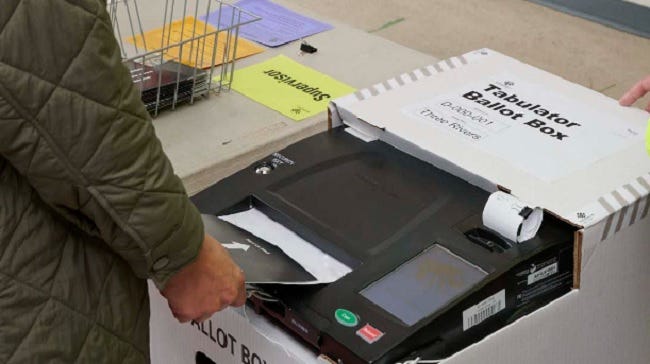Reflections on an unusual campaign and why an issue around privacy could dog B.C. Conservatives in the future
Independent candidate Charlie Smith raised concerns about a BC United allegation last summer. Will the Information and Privacy Commissioner do anything about it?
The results are in and only 121 people voted for me as the independent candidate in Richmond-Bridgeport. I shouldn’t be surprised. I didn’t knock on a single door, create a flyer, erect an election sign, or even ask anyone in the constituency to vote for me. I didn’t spend a dime on my campaign, nor did I create a campaign website.
I submitted my nomination papers to Elections BC three hours ahead of the September 27 deadline. That likely made me the last candidate to get on the ballot.
That’s not a smart thing to do if you actually want to win. I even joked that I wasn’t in a popularity contest. It’s the antithesis of what any politician should say or think.
So why did I do this? It bugs me that Premier David Eby basically vetoed a supervised consumption site near Richmond Hospital and halted a 90-unit social housing project at the corner of Cambie and Sexsmith roads. I thought that if I ran as a candidate, I could draw attention to those issues through my Substack and X accounts.
Much to my delight, Richmond News reporter Adam Campbell interviewed me so I could express my thoughts on a newspaper website.
It also troubles me that under the B.C. NDP government, health authorities have rejected basic protocols—like visitors wearing masks in Richmond Hospital—to prevent the spread of COVID-19. And I’m heartbroken over the unnecessary deaths of so many drug users because two major parties in B.C. reject the one thing that will keep them alive: a safe supply.
Was it worth it putting my name on a ballot for the first time in my life? Most definitely. I learned new things about the electoral process and the professionalism of election officials. I also discovered how incredibly difficult it is for an independent to open an election account—which is required—at a Canadian chartered bank.
It was a lot of fun participating in a Richmond Chamber of Commerce candidates’ forum. There, I had an opportunity to plead with B.C. Conservative incumbent Teresa Wat to DO SOMETHING to save drug users’ lives.
The election campaign also inspired me to write posts on various issues. I tried to solve TransLink’s $580-million financial shortfall. In another, I explained why the B.C. Conservatives’ fiscal plan was a stink bomb. In yet another, I articulated my concerns about how David Eby’s crusade against money laundering has tarnished law-abiding immigrants from China. Then, there was a column about B.C. Conservatives and book banning.
Here’s the kicker. My number of subscribers dropped by six percent over the course of the campaign. I don’t charge for my posts, so these were cancelled free subscriptions. Let that be a lesson for other Substackers considering a run for provincial office.
Was there a privacy breach?
During the campaign, I also raised concerns about party membership lists. When Wat abandoned her BC United colleagues on July 29 and joined the B.C. Conservatives, her former caucus made an allegation. And that caught my attention.
“BC United is claiming Teresa Wat’s team downloaded a significant amount of confidential member information prior to her decision to leave,” tweeted Global News BC reporter Richard Zussman.
This raises a bunch of questions:
1. Is this true? BC United did not provide proof of its allegation.
2. If it is true, was it membership information for Richmond-Bridgeport or membership information for other Richmond constituencies or membership information for the whole province?
3. If this membership information was downloaded, was it shared with the B.C. Conservatives or used in the B.C. Conservative campaign?
4. Under Section 6 of B.C.’s Personal Information Protection Act, an organization must not disclose personal information about an individual unless the individual gives consent to the disclosure. However, Section 8 of the act outlines what constitutes “implicit consent”. Moreover, Sections 14 and 15 stipulate limitations on the use of personal information and its use without consent. Sections 17 and 18 deal with disclosure of personal information. If downloading occurred, did this violate the spirit or the letter of the Personal Information Protection Act?
5. Section 34 of the act states: “An organization must protect personal information in its custody or under its control by making reasonable security arrangements to prevent unauthorized access, collection, use, disclosure, copying, modification or disposal or similar risks.” Did BC United make reasonable security arrangements? If not, did any action by BC United or Wat’s team breach the privacy rights of BC United members who had shared personal information with their party?
6. Under Section 36 of the Personal Information Protection Act, Information and Privacy Commissioner Michael Harvey can initiate investigations and audits. He can do this to ensure compliance with any provision of the act—even in the absence of a complaint.
7. I alerted the commissioner’s office about my concerns over social media. I called for an investigation. In response, I received a message saying that I could file a complaint but the office didn’t react to "complaints by social media”. I maintain that calling for an investigation is not the same thing as making a complaint.
8. Under Section 42 of the Freedom of Information and Protection of Privacy Act, the commissioner has authority to conduct investigations and audits to ensure compliance with any provision of this act. No complaint is necessary. He can also issue a legally binding order following an investigation.
9. Under the B.C. Privacy Act, it is “a tort, actionable without proof of damage, for a person, wilfully and without a claim of right, to violate the privacy of another”. If BC United membership information was downloaded in a way that violated the Personal Information Protection Act, would this constitute a tort, i.e. a civil wrong? And if so, who could file this claim and who would be the defendant? Would the party be liable or would a person who did the downloading be liable? Would members of BC United be in a position to claim damages? Or could this extend to former MLAs who ran as independents, as they too are members? Could liability extend to the B.C. Conservatives if it could ever be proven in court that they were part of a conspiracy to download information belonging to BC United about BC United members?
10. Could candidates from other parties have a legal claim if the B.C. Conservative campaign relied in part on BC United membership lists or membership lists from other parties, including at the civic and federal levels?
I do not know the answers to these questions. After all, I was just a candidate, not a lawyer who specializes in privacy rights.
Rob Botterell to the rescue?
Fortunately, the citizens of Saanich North and the Islands have elected one of B.C.’s foremost privacy-law experts as their new B.C. Green MLA. Rob Botterell led the team that created the Freedom of Information and Protection of Privacy Act. He also offered advice on the Personal Property Security Act, according to his personal website.
Botterell is highly regarded in this area of law. B.C. is very lucky to have him in the legislature when such a thorny issue has emerged.
Here are my thoughts as a candidate in the recent provincial election. At the very least, I think that Information and Privacy Commissioner Michael Harvey should order an investigation into BC United’s handling of membership lists. He can do this under Section 36 of the Personal Information Protection Act. Failing that, he should order an investigation under Section 42 of the Freedom of Information and Protection of Privacy Act.
But I do not think that Harvey should be the investigator or adjudicator. That’s because he is an Officer of the Legislature. He was hired by all MLAs, who have the power to re-appoint him when his current six-year term expires in 2030. The soon-to-be-sworn-in B.C. Conservative caucus will be part of the group that is Harvey’s de facto employer!
There’s a very famous legal phrase issued more than 100 years ago, which applies in this situation. In R v Sussex Justices, Lord Chief Justice Hewart declared: “Justice must not only be done but must manifestly and undoubtedly be seen to be done.”
For justice to be seen to be done, Harvey must assign the investigation and adjudication of this issue to an outside party. It requires someone who will be universally viewed as a disinterested decisionmaker. It cannot be anyone on the payroll of the B.C. legislature.
One very big question
Here’s my biggest question, which I want answered: was the B.C. Conservatives’ success in the election linked in any way to a violation of provincial privacy legislation? There’s no evidence of that. But if it turned out to be true, what is the remedy for opposing candidates and for members of the BC United party?
Furthermore, did BC United Leader Kevin Falcon know whether the B.C. Conservatives had membership information when he prohibited nominated candidates from running under the party banner? Was this a topic of discussion in his negotiations with B.C. Conservative Leader John Rustad?
I must reiterate that there is no proof that any individual or any political party broke any laws. This could only be determined through an independent investigation by a disinterested decisionmaker followed by a legal order. That order would then be the subject of judicial review in B.C. Supreme Court.
It’s serious stuff. And it’s why I reiterate my request to Michael Harvey to initiate an independent investigation into this issue in the absence of a complaint. He is authorized to do so under provincial legislation.
I’m keen to hear if Botterell or B.C. NDP Leader David Eby will echo my request to the commissioner.
In closing, I want to thank everyone who voted for me despite my lack of campaigning. I also want to thank those who wanted to volunteer on my campaign or donate money. I knew I was going to lose so I rejected those offers. In fact, I told one person that it would be better to donate to the food bank.
That’s because my primary purpose behind running was to elevate awareness about public issues rather than winning. I hope I have accomplished that with this post.





